Can You Drink Protein Shakes On Low Carb Diet
What if we told you there is a magic potion that helps you lose weight and build muscle—and it tastes great, too? And what if we said you could buy it by the bottle? Would you? Sure you would. Especially if it's as easy as picking up one of the best protein shakes.
Ready to drink protein shakes are the busy dieter's best friend. "Sometimes there isn't time to put a meal together or to blend all the ingredients for a protein shake, so a drink that's already made can save time and help refuel when we are too tired or can't get to a meal after working out," Carla Dueñas, RD, tells us.
If you're a heavy exerciser, don't eat enough protein, or follow a vegetarian or vegan lifestyle, protein shakes can help fill in nutritional gaps in your diet, says dietitian Lisa Moskovitz, RD, CDN, and CEO of NY Nutrition Group.
What are the benefits of bottled protein shakes?
There are countless benefits of adding protein to your diet.
- Protein boosts satiety by filling you up and by helping to slow the digestion of carbs, which stabilizes blood sugar levels.
- Your body burns more calories digesting protein compared to fat or carbs.
- Protein helps maintain muscle mass tissue, which burns more calories at rest than body fat.
One of the most convenient ways to consume more protein is through ready-to-drink protein shakes. "Bottled protein shakes offer easy, affordable, and convenient protein sources when you need them the most, such as post-workout or exercise," says Moskovitz. "In addition, many are fortified with hydrating electrolytes, bone-building calcium, vitamin D, fiber, and iron."
When should you drink a ready-to-drink protein shake?
"Following a heavy workout, it is important to get in an adequate amount of protein and carbs for sufficient recovery in a timely manner. This means consuming around 15 to 30 grams of protein, depending on individual factors, within 30 to 60 minutes after you've completed the exercise. A protein shake can be a lot more convenient and nutritionally balanced compared with other foods," says Moskovitz.
How we chose the best protein shakes.
The trouble with buying grab-and-go protein shakes is that many are made with sub-par protein sources, are teeming with artificial additives, tablespoons of added sugar, and nasty chemicals. To help you navigate all the options, we consulted experts to determine what ingredients to consume and avoid when determining the best and worst grab-and-go protein shakes.
The best protein shakes contain no artificial sweeteners, high-fructose corn syrup, or hydrogenated oils.
In addition, Dueñas recommends aiming for between 15 and 20 grams of high-quality proteins that deliver the right blend of amino acids required to build and repair muscle tissues. Following a heavy workout, Moskovitz notes you can aim for 30 grams of protein.
The best protein shakes you can buy for when you're on the go.
1. Orgain Clean Grass-Fed Protein Shake
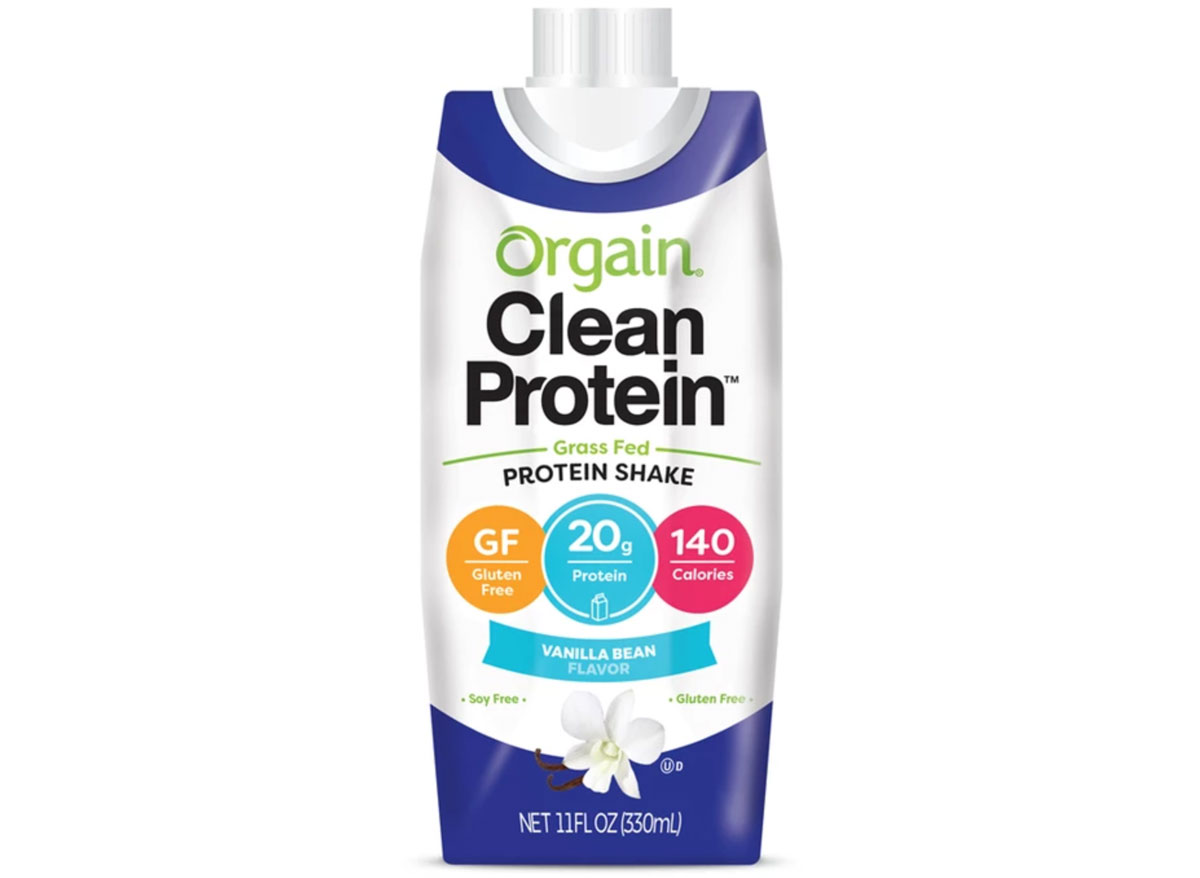
Nutrition per 11 fl oz bottle: 130 calories, 2 g fat (0 g saturated fat), 170 mg sodium, 9 g carbs (1 g fiber, 4 g sugar), 20 g protein
For the whey protein crowd, this grass-fed milk protein shake is prime. The Orgain brand is a favorite of Moskovitz. "These protein shakes are] loaded with extra nutrients such as calcium, iron, and fiber," she says. The milk is sourced from cows that are raised without growth hormone rBST, steroids, antibiotics, and GMOs. This shake is free of refined sugars (instead, sweetened with agave, monk fruit extract, and stevia), and it's free of carrageenan. With its low sugar count, this shake is perfect for busy professionals, moms on-the-go, or students who need something to get them through that 3-hour seminar.
2. Fairlife Core Power Protein Shakes

Nutrition per 14 oz bottle, chocolate: 170 calories, 4.5 g fat (3 g saturated fat), 260 mg sodium, 8 g carbs (1 g fiber, 5 g sugar), 26 g protein
Upgrade your protein shake with this offering from Fairlife. "When my clients ask for a protein shake, I like to recommend Fairlife Core Power. This packs about 26 grams of protein, which can occasionally be considered a meal replacement. It's made from real milk to provide a complete protein source, and it's lower in added sugar while still tasting great. These shakes have a great finish in taste without leaving an annoying residue in your mouth," says dietitian Emily E Tills, MS, RDN, CDN, a Nutrition Coach at Nourished With Emily.
3. OWYN Vegan Protein Shake, Cookies and Cream
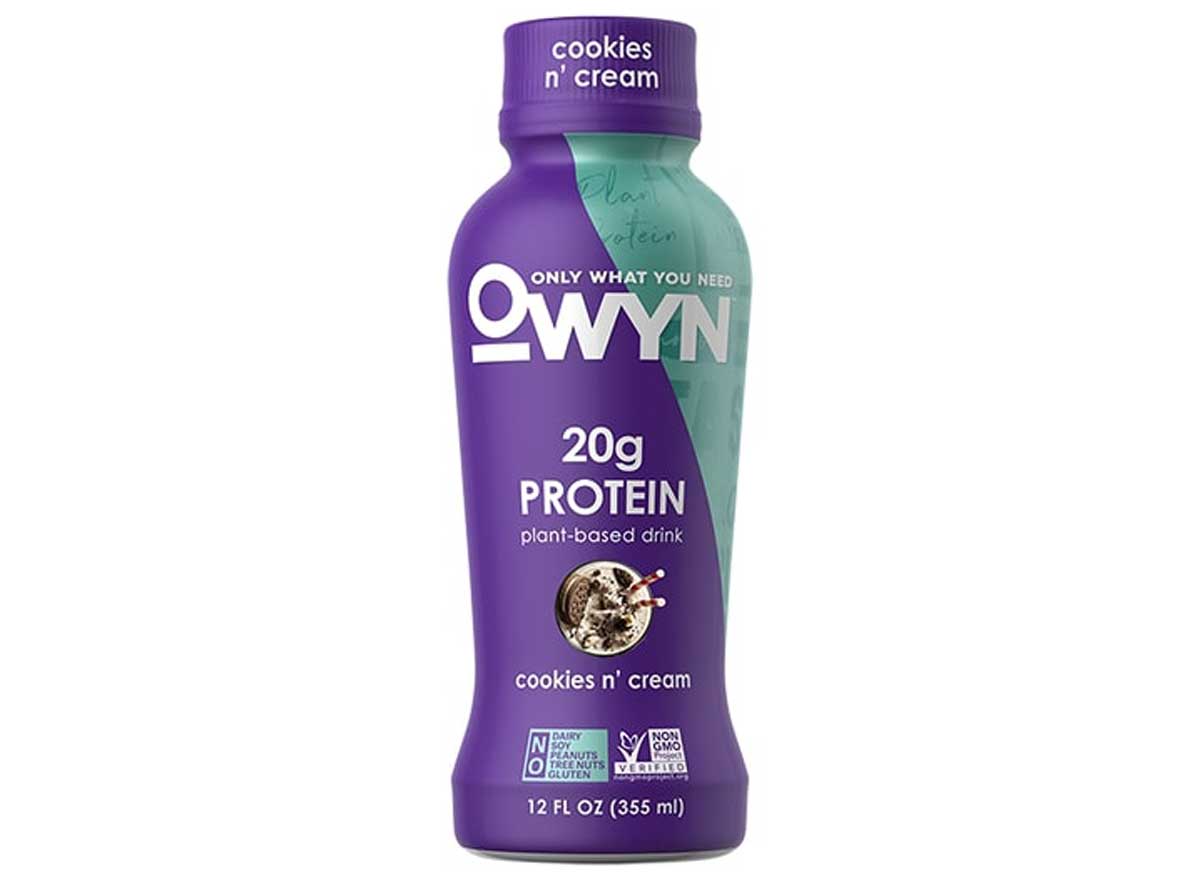
Nutrition per 11 fl oz bottle: 180 calories, 7 g fat (1 g saturated fat), 270 mg sodium, 10 g carbs (5 g fiber, 4 g sugar), 20 g protein
We're big advocates for using plant protein powders. Unlike whey powders, plant protein won't lead to bloat, are less likely to include nasty artificial sweeteners, and have been found to be just as effective in building muscle and strength, according to a Nutrition Journal study.
"OWYN are 100% plant-based, with no artificial sweeteners, and contain a good source of protein and fiber. This winning combo helps keep blood sugars stabilized and hunger at bay. They are also a good source of iron and plant omega-3s!" says Moskovitz.
4. FitPro GO!
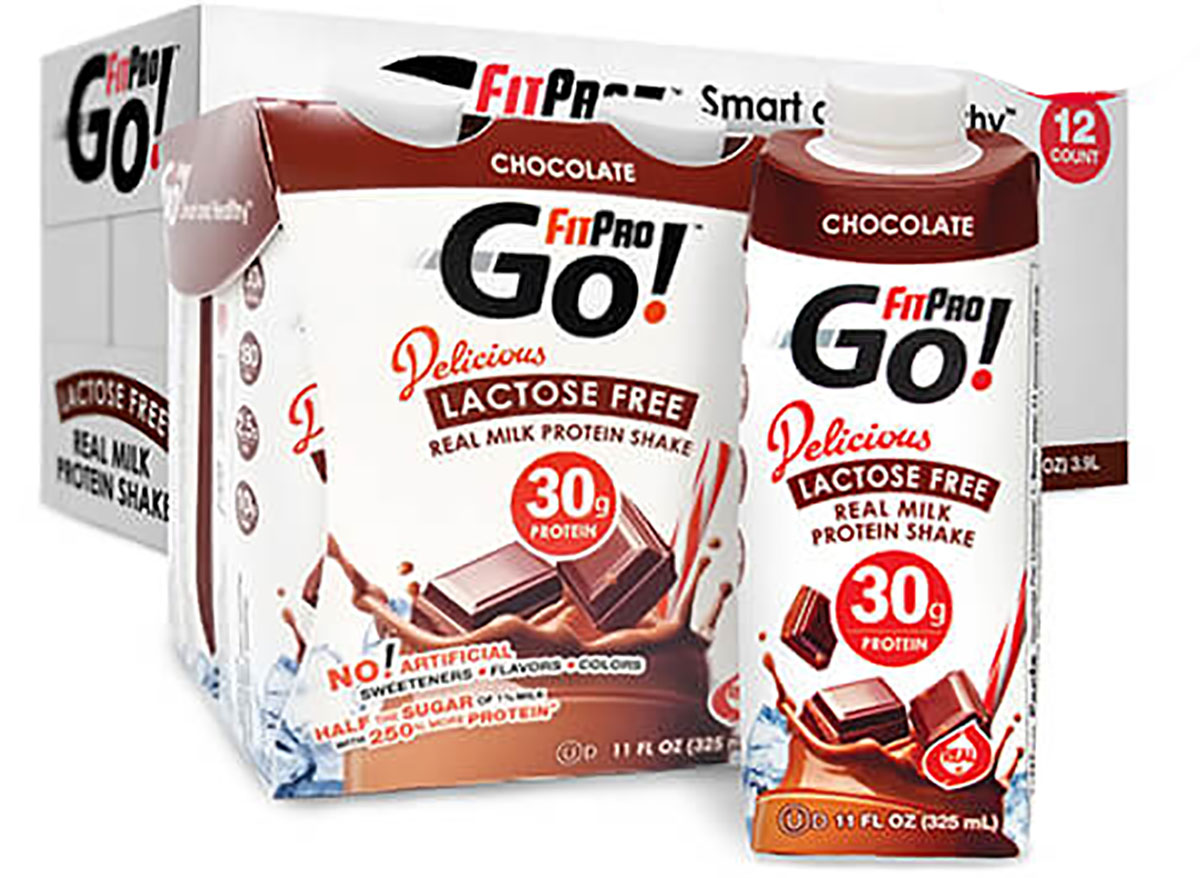
Nutrition per 14 fl oz bottle, chocolate: 180 calories, 2.5 g fat (1 g saturated fat), 330 mg sodium, 10 g carbs (2 g fiber, 8 g sugar), 30 g protein
These hormone-free, milk-based drinks are lactose-free due to an ultrafiltration process, which removes most of this naturally occurring sugar (the sugar you see is from added cane sugar, and it's also sweetened with stevia and monk fruit). FitPro is flavored with natural vanilla and cocoa, emulsified with gellan gum instead of carrageenan, and is an excellent source of vitamins and minerals. This shake stands alone in providing the most protein with the fewest ingredients.
5. Harmless Harvest Protein & Coconut Toasted Coconut
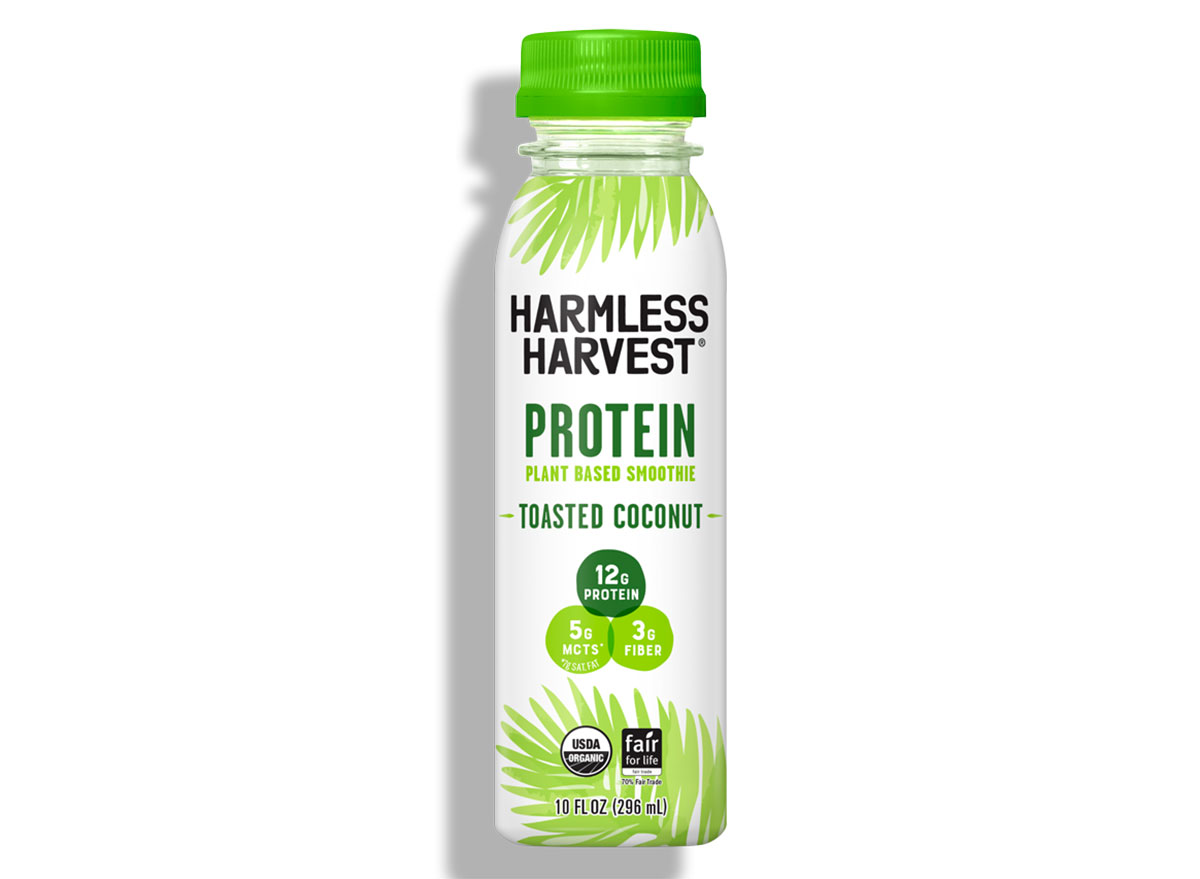
Nutrition per 10 fl oz carton: 180 calories, 8 g fat (7 g saturated fat), 160 mg sodium, 14 g carbs (3 g fiber, 8 g sugar), 12 g protein
Sweetened with a touch of cane sugar, this is a new breed of protein shake; made primarily of electrolyte-rich coconut water, Harmless Harvest also supplies more protein than two eggs with the addition of a plant-based protein blend of pea protein, pumpkin seed protein, and sunflower seed protein—all organic. The benefits of coconut water are that its electrolytes will help rehydrate you while the nutrients in milk proteins replenish glycogen stores and help muscles recover. After a particularly strenuous workout, pair it with a piece of fruit to boost healthy carbs available for your body's recovery.
6. Iconic Lean Protein Shake
![]()
Nutrition per 11.5 fl oz bottle, café latte: 140 calories, 2.5 g fat (0 g saturated fat), 85 mg sodium, 8 g carbs (4 g fiber, 0 g sugar), 20 g protein
Made with clean ingredients like grass-fed milk protein isolate, cocoa powder, sea salt, and real Colombian Coffee (yes, there are 100 mg of caffeine in this bottle!) this is one of the better bottles in the supplement store. "It's very rich in protein, and it's perfect for muscle building and maintenance because it also contains calcium and vitamin B12," says dietitian Ilyse Schapiro, MS, RD, CDN.
7. Koia Chocolate Banana Plant Protein Drink
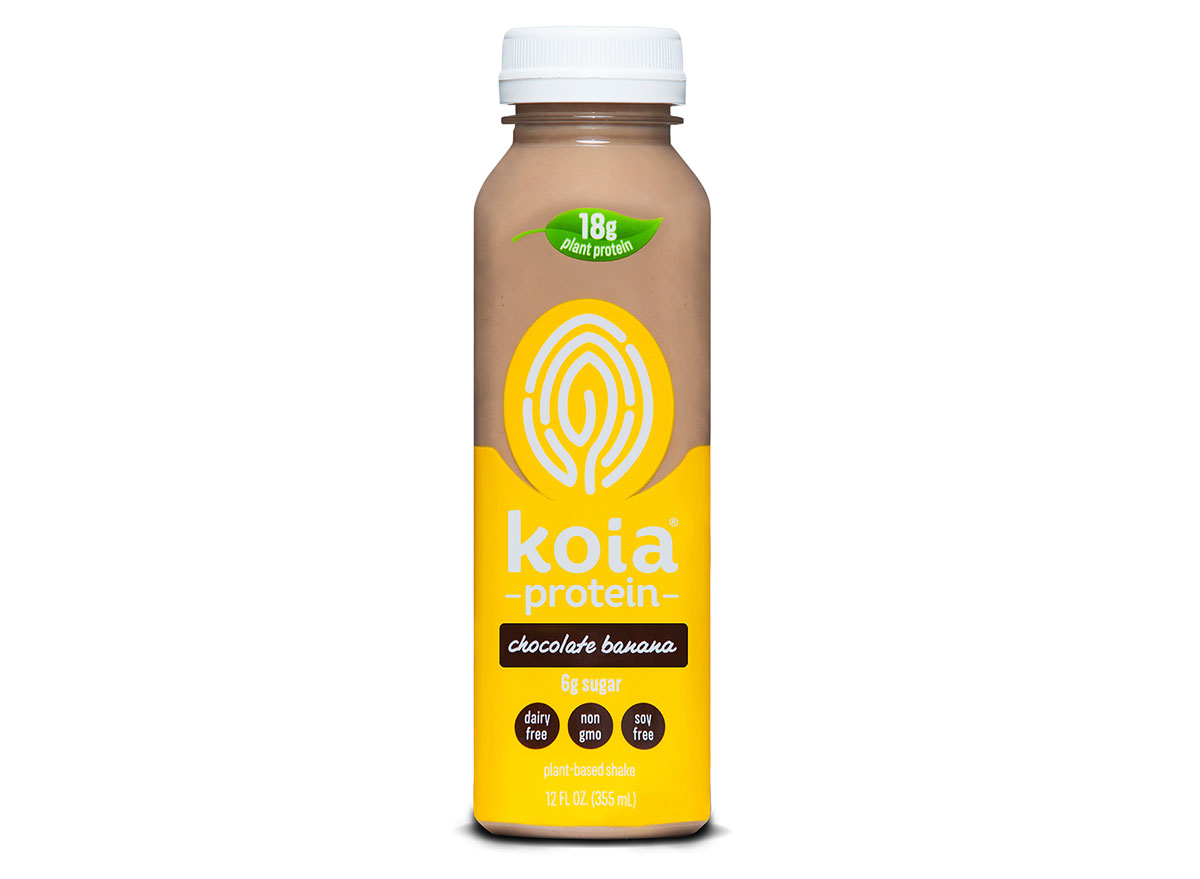
Nutrition per 12 fl oz bottle: 190 calories, 7 g fat (2 g saturated fat), 280 mg sodium, 14 g carbs (6 g fiber, 6 g sugar), 18 g protein
Made with a proprietary blend of brown rice, pea, and chickpea protein, this plant-based shake is a great pick for your daily dose of protein. Although the coconut milk and cane sugar drive most of the sugar count, it's also sweetened with a touch of monk fruit extract.
The worst ready-to-drink protein shakes you can buy.
Like protein powders, many of the labels of these shakes read like the stock list of a chemistry lab and are made with obscure protein sources, artificial sweeteners, too much sugar, chemical additives, and trans fat.
1. Ensure Plus
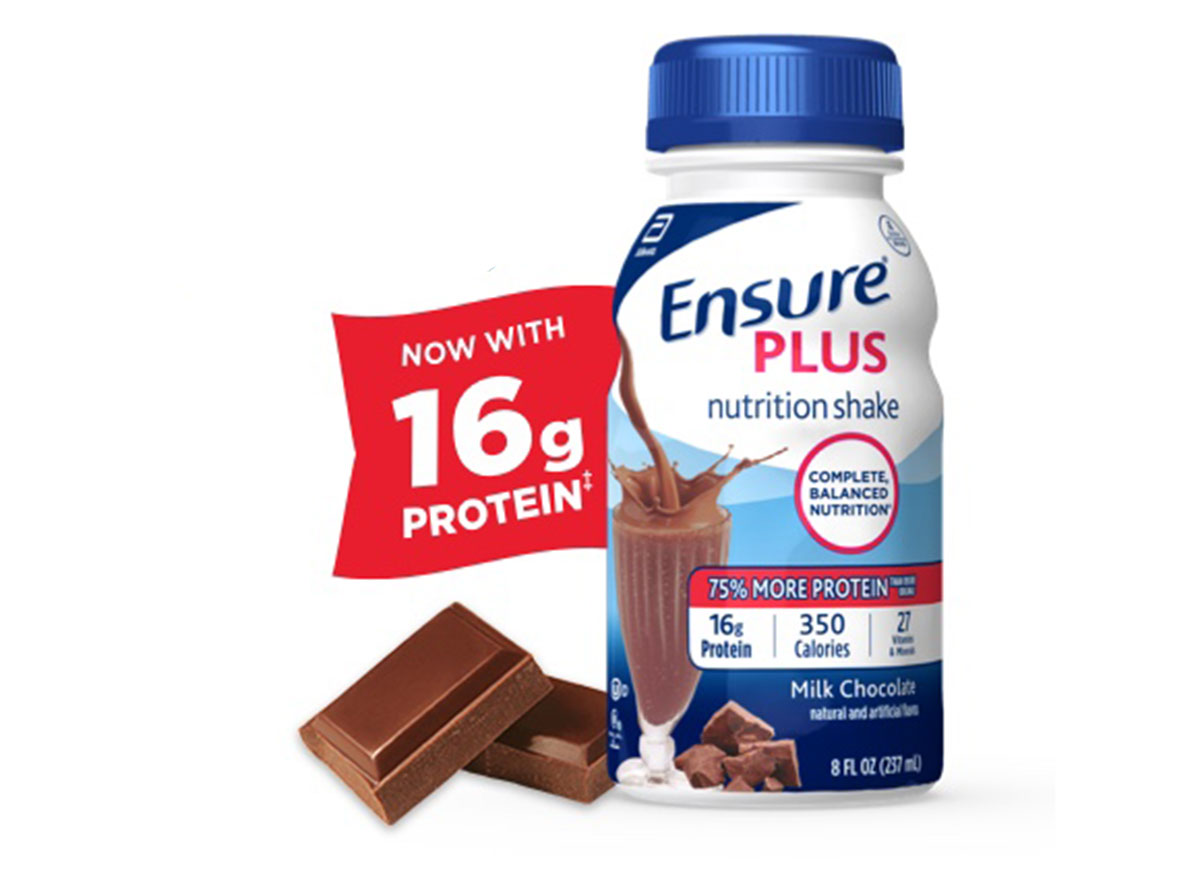
Nutrition per 8 fl oz bottle: 350 calories, 11 g fat (1.5 g saturated fat), 210 mg sodium, 48 g carbs (1 g fiber, 22 g sugar), 16 g protein
Don't be fooled by Ensure's claims that this is "complete, balanced nutrition." With more sugar than protein, this shake won't be of much help when it comes to weight loss. That's not even mentioning the fact that the product is full of artificial flavors, conventional nonfat milk, inflammatory vegetable oils, and carrageenan.
2. SlimFast Originals

Nutrition per 11 fl oz bottle: 180 calories, 5 g fat (1 g saturated fat), 120 mg sodium, 25 g carbs (5 g fiber, 19 g sugar), 10 g protein
On top of its poor protein showing—there's almost double the amount of sugar than there is protein—SlimFast's downfall is also their addition of mono and diglycerides, which often are sources of the artery-clogging trans fats that are linked to cardiovascular disease. Plus, the drink contains milk protein concentrate from conventional cows, which contains as many risks as it does benefits, artificial flavors, carrageenan, and artificial sweeteners Sucralose and Acesulfame Potassium.
3. Boost High Protein Shake
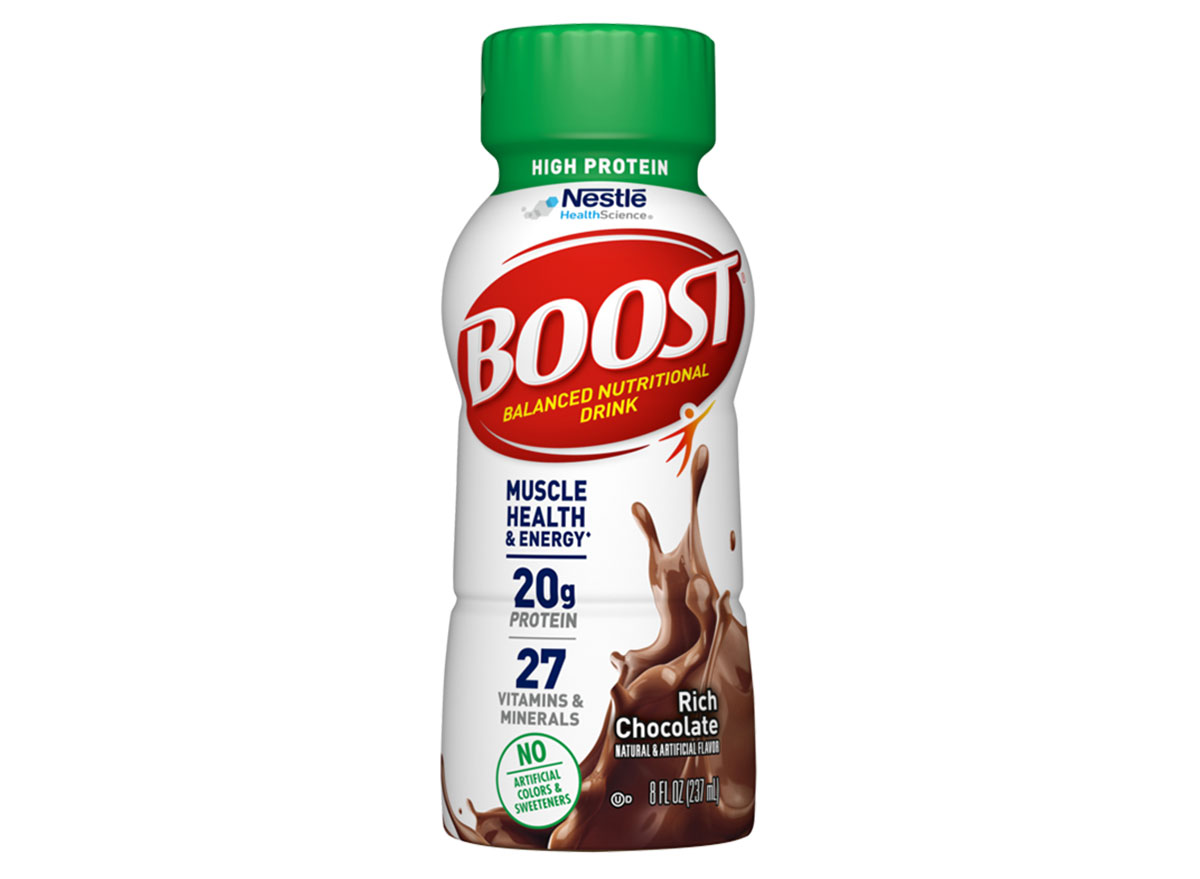
Nutrition per 8 fl oz bottle, rich chocolate: 240 calories, 6 g fat (1 g saturated fat), 230 mg sodium, 28 g carbs (0 g fiber, 15 g sugar), 20 g protein
Before milk protein concentrate is even listed, sugar is one of the first ingredients behind water. This shake is also made with artificial flavors and inflammatory vegetable oils which have a high omega 6 to omega 3 ratios and can cause weight gain over time.
4. Bolthouse Farms Protein PLUS
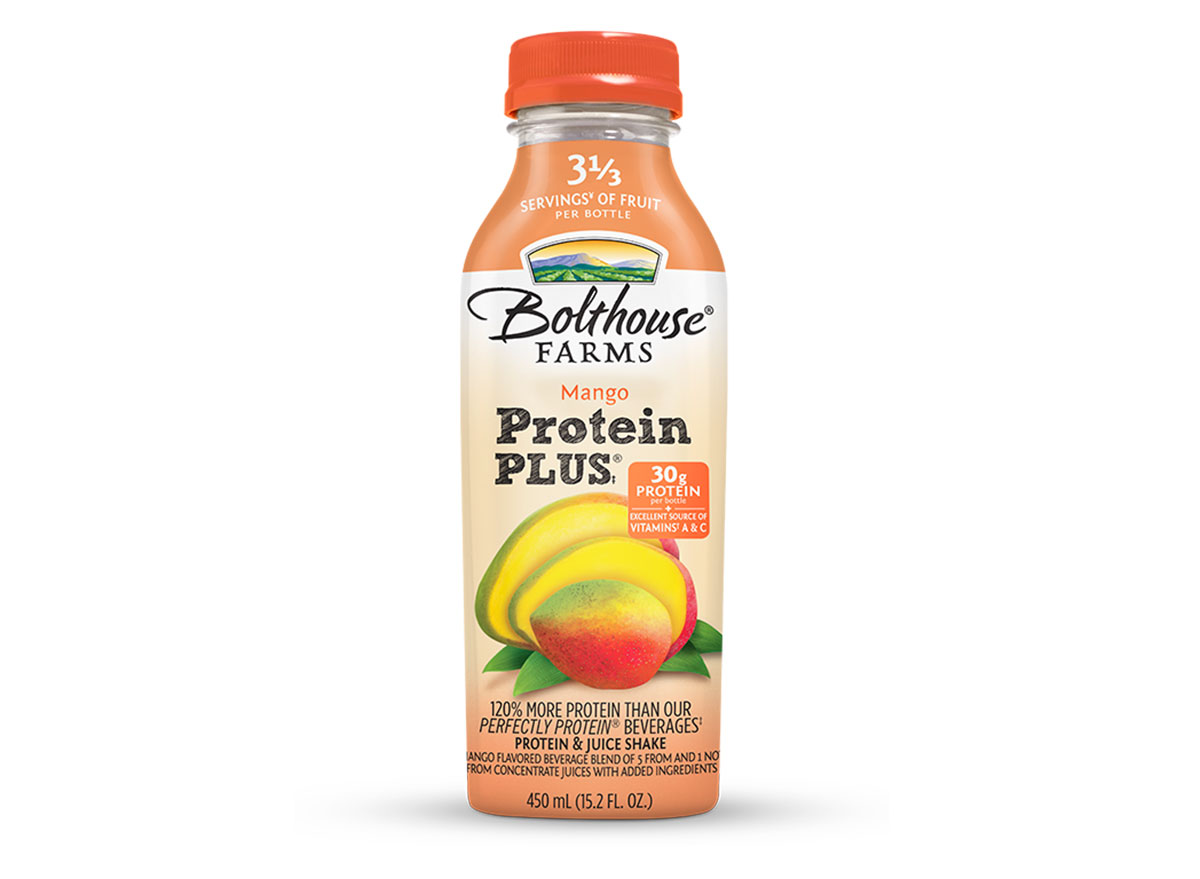
Nutrition per 15.2 fl oz bottle, mango: 380 calories, 2.5 g fat (1 g saturated fat), 260 mg sodium, 59 g carbs (3 g fiber, 49 g sugar), 30 g protein
They might be naturally sweetened, but that doesn't justify gulping down nearly 50 grams of sugar in a bottle. It'll give you a solid dose of protein along with vitamins and minerals, but you'll most likely start to feel hungry soon after guzzling down the nearly 400-calorie bottle—which isn't great news if you're on a calorie-restricted diet.
5. Premier Protein
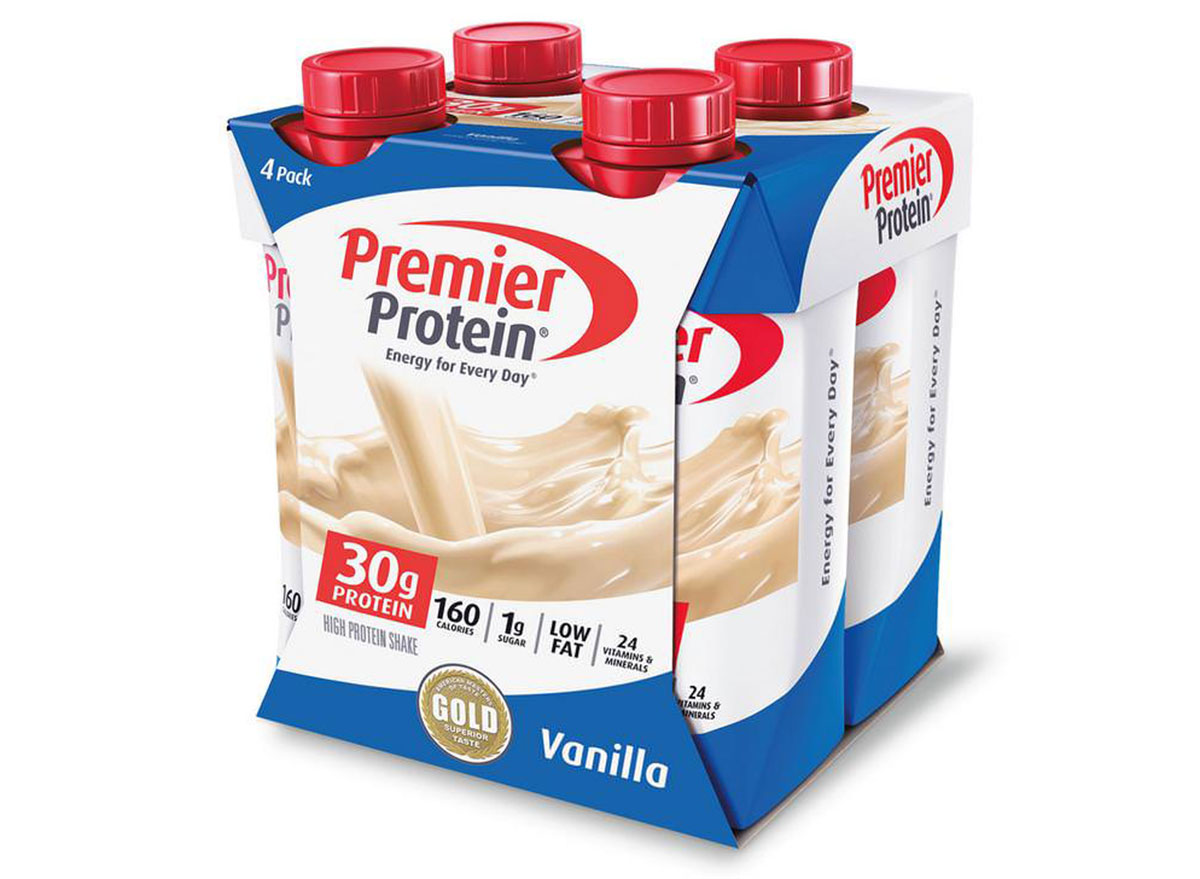
Nutrition per 14 fl oz bottle, vanilla: 160 calories, 3 g fat (0.5 g saturated fat), 230 mg sodium, 4 g carbs (1 g fiber, 1 g sugar), 30 g protein
The list of ingredients is long here but if you take a close look, you'll spot questionable additions like sucralose, carrageenan.
6. Pure Protein Shake
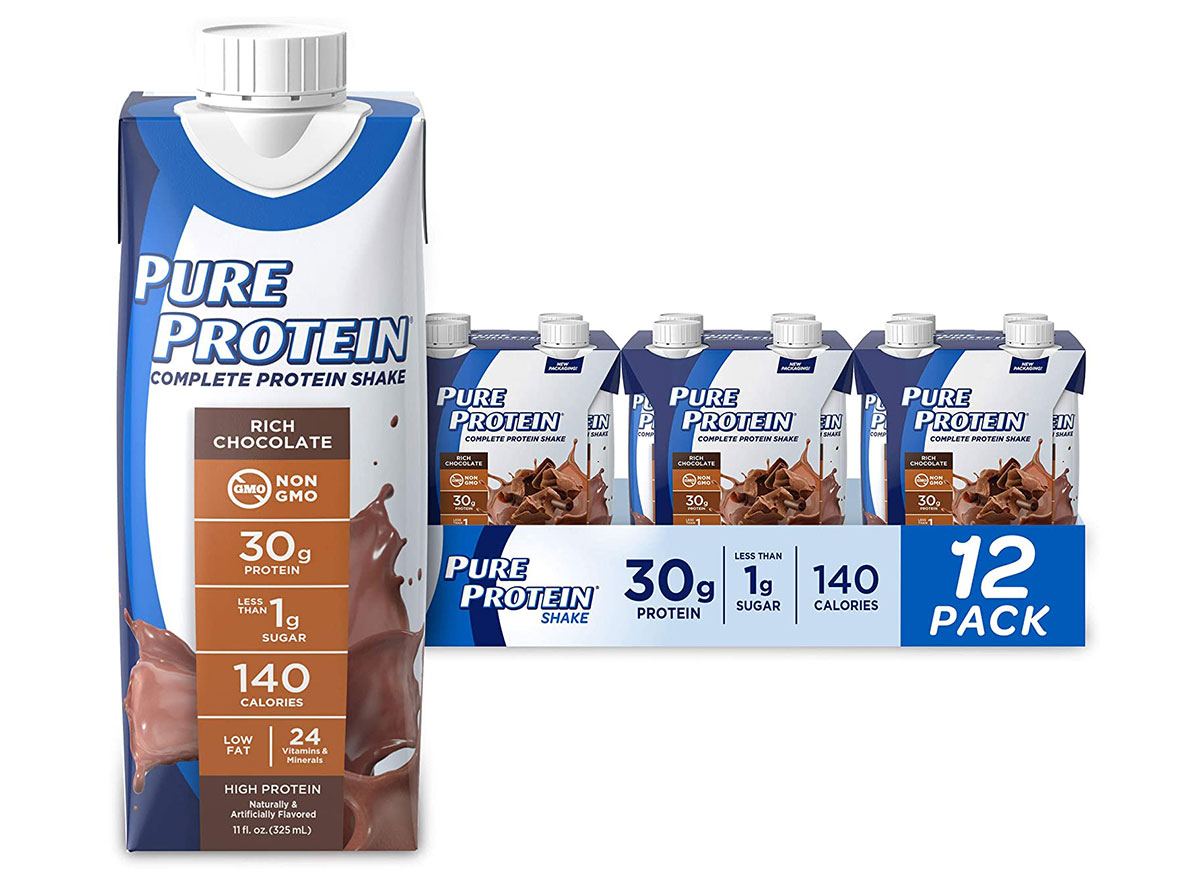
Nutrition per 11 fl oz bottle, chocolate: 140 calories, 2 g fat (0 g saturated fat), 240 mg sodium, 6 g carbs (4 g fiber, 1 g sugar), 30 g protein
It's low fat and low carb, but Pure Protein is sweetened with artificial sugar, sucralose, and artificially flavored with who knows what.
7. Glucerna Hunger Smart Shake
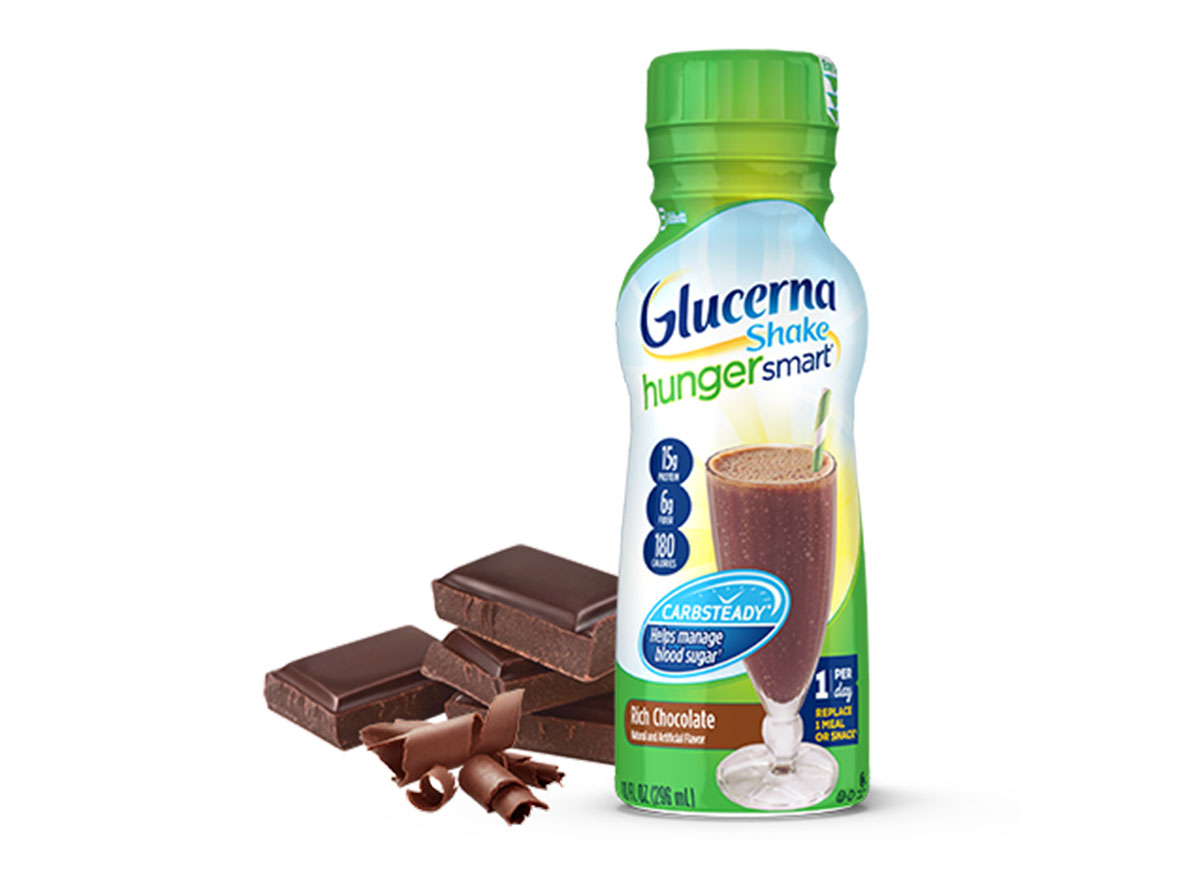
Nutrition per 11.5 fl oz bottle: 180 calories, 8 g fat (1.5 g saturated fat), 300 mg sodium, 16 g carbs (5 g fiber, 6 g sugar), 15 g protein
We understand that someone with diabetes would be drawn to this product, as it's targeted to their audience—but that doesn't mean Glucerna should be filling their customers up with fructose. This sugar molecule doesn't spike blood glucose levels as glucose does, but experts speculate that it's Americans' increased intake of fructose—which our body turns into fat and inflammatory compounds more easily than it does with glucose—that is to blame for the equivalent increase in rates of metabolic disorders and obesity, not just "sugar."
8. Muscle Milk Protein Smoothie
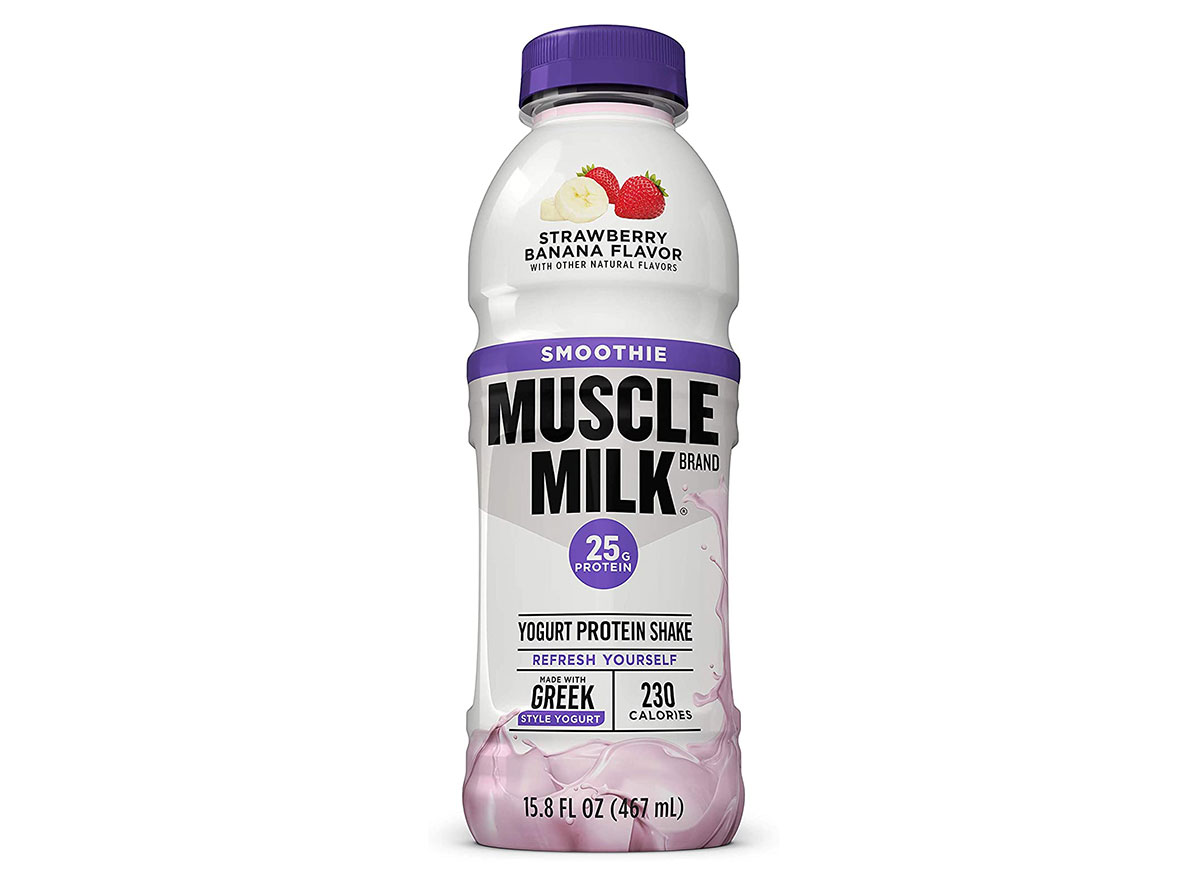
Nutrition per 16 fl oz bottle: 230 calories, 3.5 g fat (2.5 g saturated fat), 135 mg sodium, 25 g carbs (1 g fiber, 10 g sugar), 25 g protein
Don't be fooled by our favorite word "smoothie." Although protein powders and smoothies go together rather nicely, we're only talking about the homemade versions which use real yogurt. Muscle Milk claims to use Greek yogurt, but they also note that the drink is heat-treated after culturing, which kills off any live cultures that may have had probiotic benefits.
9. Naked Protein & Greens
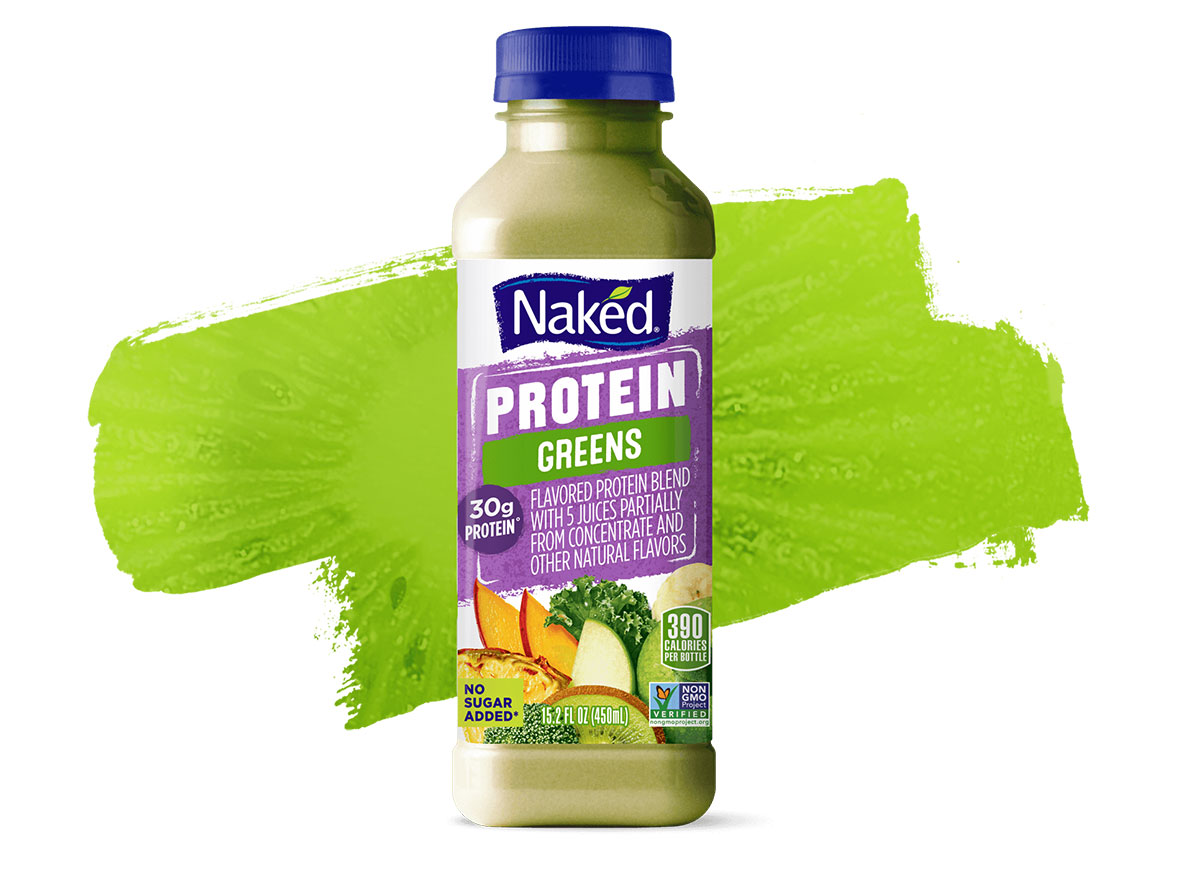
Nutrition per 15.2 fl oz bottle: 390 calories, 2 g fat (0.5 g saturated fat), 260 mg sodium, 62 g carbs (4 g fiber, 50 g sugar), 30 g protein
Just because experts recommend a carb to protein ratio of 2:1 for optimal muscle recovery doesn't mean if a drink has a 2:1 ratio it's good to drink. For example, this Protein & Greens by Naked, which satisfies the 2:1 ratio, but contains an astounding 50 grams of sugar in one bottle. They might not be added sugars, but all are from fruit juice concentrates, which means that most of the sugars are fructose—a sugar compound that can't even be used by your body to replenish its glucose-based energy stores.
10. Nature's Best Isopure Cocotein
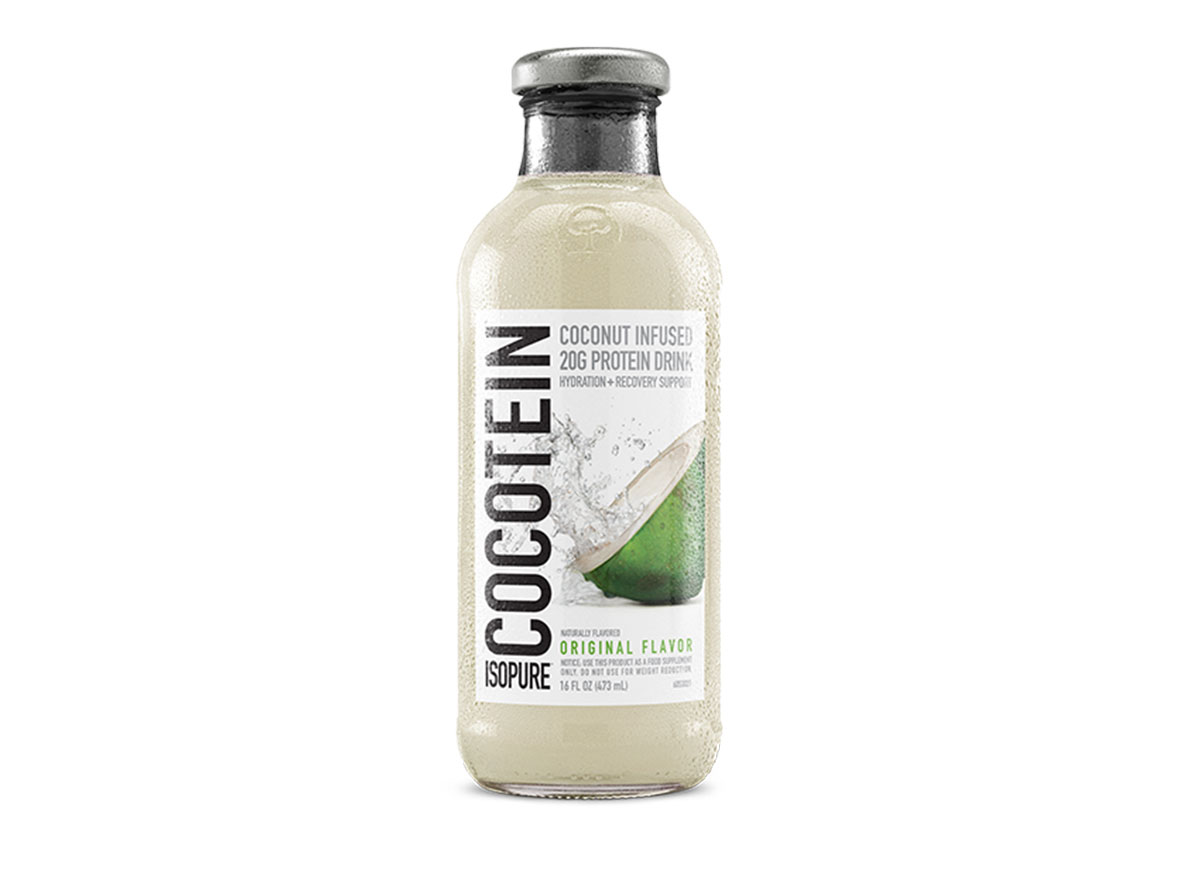
Nutrition per 16 fl oz bottle: 100 calories, 0 g fat (0 g saturated fat), 70 mg sodium, 6 g carbs (0 g fiber, 5 g sugar), 20 g protein
Although it boasts one of the shortest ingredient lists out of every protein drink on the market—only including water, Isopure's whey protein isolate, coconut water concentrate, natural flavor, and phosphoric acid—we had to tick this drink off because of the addition of an artificial sweetener, sucralose. Although recent science indicate they're not carcinogenic, as feared, artificial sweeteners have been shown to either increase or show no effect on your appetite (whereas the glucose in sugar can increase levels of the "I'm full" hormone, leptin) and can harm your gut health due to their indigestibility.
Can You Drink Protein Shakes On Low Carb Diet
Source: https://www.eatthis.com/protein-shakes/

0 komentar:
Posting Komentar